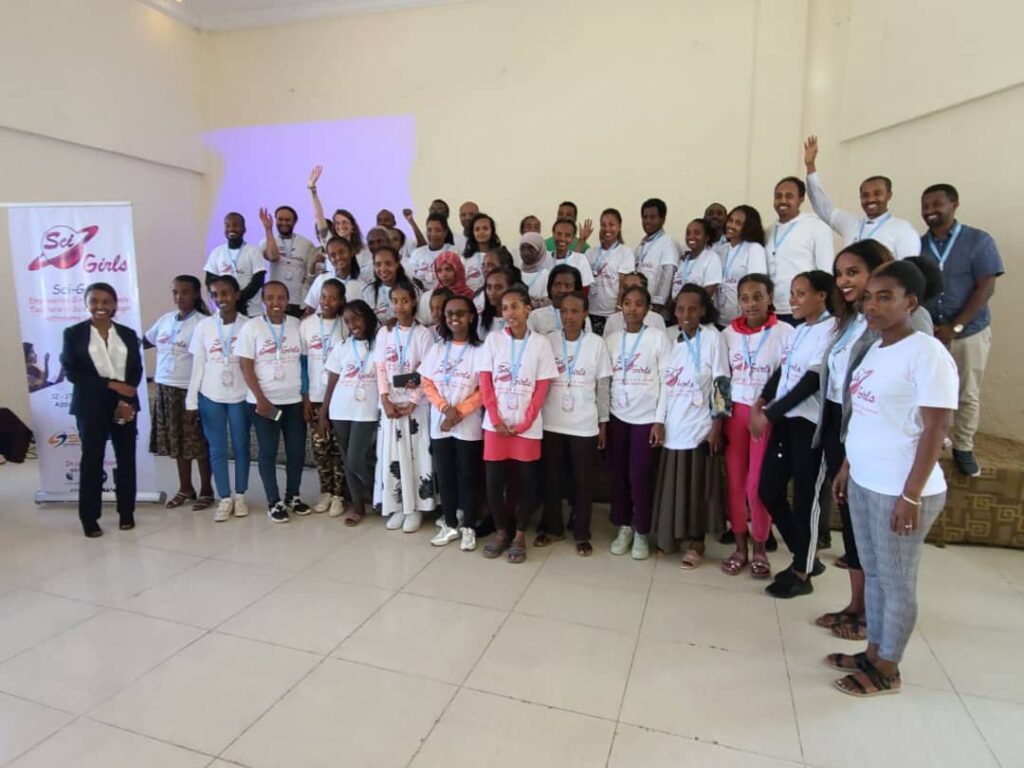The SciGirls project aims to improve, in the long term, the gender gap in science, and the current lack of girls in STEM, by empowering secondary school girls from rural areas and their female science teachers using astronomy and its multidisciplinarity. The team organised a capacity-building workshop for 30 participants from different regions of Ethiopia, with an aim to train girls and their (female) teachers as advocates of STEM in rural areas. In particular, our main objectives through SciGirls were
- human capacity building promoting STEM through astronomy, its multidisciplinarity and importance for society,
- improve communication skills
- empower girls as future leaders in their communities
- understand better the challenges that girls and their female teachers are facing in their communities across Ethiopia, and
- bring more awareness about professional careers in STEM.
Activities:
A 6 day capacity-building workshop was organised in Addis Ababa in December 2022. Secondary school girls and their female science teachers, all coming from rural, socio-economic disadvantaged areas of Ethiopia, from 12 different areas, and from 6 different regions (except 1 participant from Addis Ababa). We set up several criteria in selecting participants such that the girls are from grades 9 or 10, from public schools, interested in STEM, from rural areas, able to promote STEM in their communities after the training, had parents’ approval to travel, with (at least) basic English knowledge, and committed to attending the whole training. Teachers, in addition, had to be all females, science teachers, and committed to taking care of girls during the travel and during the training.
The workshop included several sessions about the introduction to astronomy (Solar System, world of stars, galaxies and the Universe), the importance of astronomy and space for development, introduction to space science (e.g., Earth Observations, use of space in fighting climate change, introduction to space engineering), astronomical observations, big data science and its connection with astronomy. The practical side included stargazing sessions with small telescopes and small experiments for teachers using the Network for Astronomy School Education (NASE) program. One full day was dedicated to small research projects, where the girls and teachers had to use real astronomical data, learn a simple Virtual Observatory tool to represent the data, interpret the results, and finally present what they did and their findings. Visits to the Ethiopian Space Science and GeoSpatial Institute, Entoto Observatory, a new library in Addis, and the new science museum were also organised. The last session was dedicated to the importance of STEM for development, professional opportunities in STEM, and women and girls in science. We had a very diverse team of lecturers in terms of gender, age, and background, with > 20 people being involved in the training. The working languages were Amharic and English (with Amharic translation available).
Outcomes:
- The project improved the knowledge of girls and their teachers in astronomy, space science and their importance for development, but also their technical skills through the small research projects, NASE experiments, and all organised visits. 93% felt SciGirls improved their knowledge and skills significantly and 95% of all participants expressed that they learned a lot through the projects.
- SciGirls training increased the interest in STEM of all participants. 100% of participants became more inspired and motivated in STEM.
- 94% of participants changed their opinion about the importance of astronomy for society and 100% changed their opinion about the importance of STEM for society.
- Potential advocates of STEM across Ethiopia were identified, to inspire many other girls and boys in rural areas to do STEM. In the final evaluation form, all participants expressed interest in becoming advocates of STEM in their communities.
- It strengthened connections with girls and teachers coming from different regions, which gives us an opportunity to continue to promote science and the importance of women in science across Ethiopia in the future.
In the future, the team wants to continue with the SciGirls project by extending activities to other regions and by supporting the trained girls and teachers to serve as as advocates of STEM.

